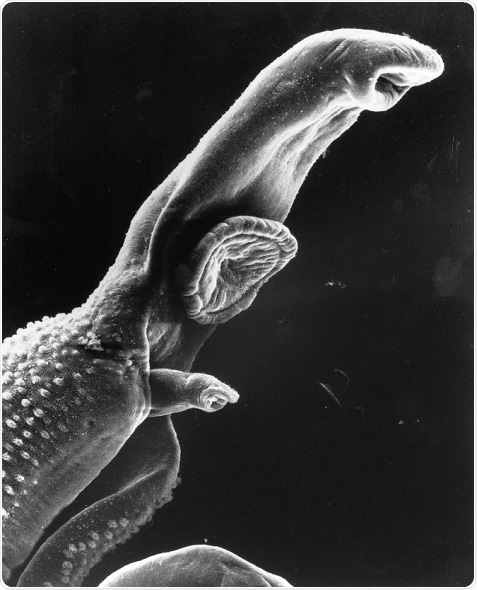Dec 13 2018
Of the 34 million people worldwide with HIV, and the 200 million with schistosomiasis, the majority live in Africa— where millions of people are simultaneously infected with both diseases. Now, researchers reporting in PLOS Neglected Tropical Diseases have shown that schistosomiasis infections are associated with increased HIV onward transmission, HIV acquisition in HIV negative women with urogenital schistosomiasis, and progression to death in HIV positive women.

“Schistosome Parasite: This schistosome parasite enters the body through the skin of persons coming in contact with infested waters. The adult worm lives in the veins of its host. The parasite is magnified x256 in this photograph.” Image Credit: Wetzel and Shaefer, Wikimedia Commons, Public Domain, 2001
Schistosomiasis is caused by a parasitic worm and is second only to malaria in terms of parasitic diseases with the most global health impact. Schistosomiasis may cause lesions in the genital tract and has been shown—in cross-sectional studies— to be associated with HIV prevalence.
In the new work, Dr. Kristin Wall, of Emory University, USA, and colleagues retrospectively tested the blood sera of 2,145 people enrolled in a cohort of HIV-discordant heterosexual couples in Zambia. Each sample was measured for schistosome-specific antibody levels. In addition, health information including HIV status over time and death was available for the cohort.
59% of all participants were positive for a schistotome-specific antibody response. Among men and women positive for HIV, baseline response for schistosomiasis was associated with an increased risk of transmitting HIV to their uninfected partner. In addition, among women, schistosomiasis was associated with increased acquisition of HIV (in HIV negative women with urogenital schistosomiasis) and increased progression to death (in HIV positive women).
“Since treatment of schistosome infections with praziquantel is inexpensive, effective, and safe, schistosomiasis prevention and treatment strategies may be a cost-effective way to reduce not only the symptoms associated with the infection, but also new cases of HIV and death among HIV+ persons,” the researchers say.